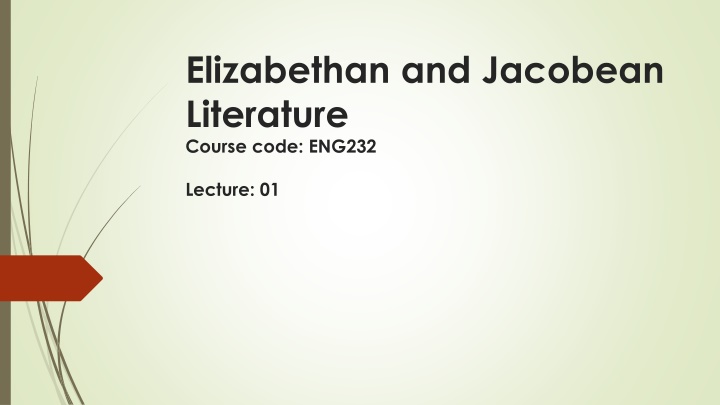
Exploring Elizabethan and Jacobean Literature: A Dive into the Golden Age of English Literature
Discover the rich literary landscape of the Elizabethan and Jacobean eras, featuring renowned playwrights and poets such as Shakespeare, Marlowe, Jonson, and more. Delve into the drama and poetry of this vibrant period, characterized by sonnets, plays, and diverse themes. Unravel the evolution of the sonnet form and the contributions of key poets, including Sir Philip Sidney, Edmund Spenser, and William Shakespeare, in shaping the literary legacy of the time.
Download Presentation

Please find below an Image/Link to download the presentation.
The content on the website is provided AS IS for your information and personal use only. It may not be sold, licensed, or shared on other websites without obtaining consent from the author. If you encounter any issues during the download, it is possible that the publisher has removed the file from their server.
You are allowed to download the files provided on this website for personal or commercial use, subject to the condition that they are used lawfully. All files are the property of their respective owners.
The content on the website is provided AS IS for your information and personal use only. It may not be sold, licensed, or shared on other websites without obtaining consent from the author.
E N D
Presentation Transcript
Elizabethan and Jacobean Literature Course code: ENG232 Lecture: 01
Elizabethan Era of English Literature Elizabethan Literature is commonly a reference to the body of works written during the reign of Elizabeth I of England (1558 1603). Probably the most splendid age in the history of English literature, during which such writers as Sir Philip Sidney, Edmund Spenser, Christopher Marlowe, Ben Jonson, and William Shakespeare flourished.
Elizabethan Era of English Literature DRAMA: Drama was the greatest achievement of the Elizabethan Age. It reached the vast popular audience at all levels of society. All the writers of the time, except Sidney and Spenser, wrote a lot of plays. Among them, the most famous were William Shakespeare, Christopher Marlowe and Ben Jonson. POETRY: The Elizabethan Age is considered the Golden Age of the English drama but Poetry was held in high consideration, too. Renaissance poetry is mostly identified with the sonnet but there were other popular types of poetry such as the songs and madrigals (after the Italian name), pastoral poetry, patriotic poetry, religious poetry, satirical and mocking poetry and erotic poetry. The term sonnet derives from the Italian sonetto . It is a short poem of fourteen lines expressing personal feelings and emotions. The Petrarchan sonnet, also called the Italian sonnet, is made up of fourteen lines divided into an octave and a sestet usually rhyming ABBA ABBA CDC DCD (or CDE CDE).
Elizabethan Era of English Literature The octave introduces a theme, a problem or a particular situation and the sestet provides a resolution, a comment on the situation or the personal feelings of the poet. Elizabethan sonnets modified this form and divided the four lines into three quatrains and a final rhyming couplet. Important sonneteers who wrote collections of love sonnets were: Sir Philip Sidney, Edmund Spenser and William Shakespeare. The final pattern of the Elizabethan sonnet is three quatrains and a final couple of verses rhyming ABAB CDCD EFEF GG. Elizabethan sonneteers often develop a theme in the three quatrains and use the final couplet to summarise or deny it, to give an answer or propose a solution.
Elizabethan Era of English Literature After Sidney and Spencer poetry played a minor role in literature. In the late Renaissance, however, we meet three great poets: Ben Jonson, John Donne and above all John Milton. During the Puritan Age the poets were grouped into Cavalier Poets and Metaphysical poets . Jonson and Donne were the leaders of the two groups. The followers of Jonson, known as the Tribe of Ben , were also called Cavaliers because they were on the side of royalists. The followers of Donne, known as Metaphysical Poets , were on the side of Parliamentarians and wrote on religious and on sensual themes. Their poems often dealt with difficult arguments and contained elaborate sentences rich in symbols, metaphors, similes and paradox. A poet of the time, who belonged neither to the Cavaliers nor to the Metaphysical, was Andrew Marvell. He combined the qualities of the two groups.
Elizabethan Era of English Literature PROSE:Although the Elizabethan age is called The Golden Age of English poetry and drama, it should also be regarded as a glorious age of English prose, for English prose was set on the track of glory by such great prose writers. Of the original prose writers of the Elizabethan age, John Lyly was the most famous. There was another great scholar who contributed a great deal to the enrichment of English prose. He was Francis Bacon (1561-1626). He was the first to introduce in English the literary genre, known as the Essay, innovated by the French philosopher Montaigne. Bacon was both a scholar and a creative genius with a unique style of his own.
Characteristics of Elizabethan literature Elizabethan literature was marked by a strong national spirit, by patriotism, by religious tolerance, by social content, by intellectual progress & by unbounded enthusiasm. Some of the major characteristics of Elizabethan literature are: 1. Revival of Interest in Greek Literature 2. Abundance of Output 3. The New Romanticism 4. Spirit of Independence 5. The Development of Drama 6. Development of poetry and prose
Recommended reading: http://elizabethanenglandlife.com/literary-features- elizabethan- era.html#What_are_the_main_characteristics_of_Elizabet han_era_Poetry_prose_and_drama
